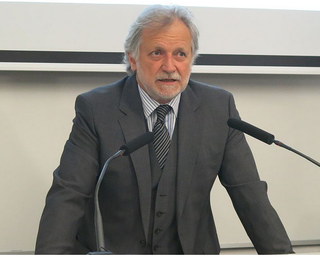See also
- Palazzo Di Gregorio, a building in Alcamo, Sicily
De Gregorio, DeGregorio, Di Gregorio and DiGregorio are surnames. Note that in some entries listed below, Gregorio is considered the surname. People so named include:
Conti is an Italian surname.
Luis is a given name. It is the Spanish form of the originally Germanic name Hludowig or Chlodovech. Other Iberian Romance languages have comparable forms: Luís in Portuguese and Galician, Lluís in Aragonese and Catalan, while Luiz is archaic in Portugal, but common in Brazil.
Guzmán or de Guzmán is a Spanish surname. The Portuguese language equivalent is Gusmão.
José is a predominantly Spanish and Portuguese form of the given name Joseph. While spelled alike, this name is pronounced very differently in each of the two languages: Spanish [xoˈse]; Portuguese [ʒuˈzɛ].

Luisa Isabel Álvarez de Toledo y Maura, 21st Duchess of Medina Sidonia, GE was the holder of the Dukedom of Medina Sidonia in Spain. She was nicknamed La Duquesa Roja or The Red Duchess due to her lifelong left-wing, anti-Francoist, pro-democracy political activism.
Ricci is an Italian surname, derived from the adjective "riccio", meaning curly.
Grassi is an Italian surname. Notable people with the surname include:
Federico is a given name and surname. It is a form of Frederick, most commonly found in Spanish, Portuguese and Italian.
Evangelista may refer to:
Bernardino is a name of Italian, Hispanic, or Portuguese origin, which can refer to:

Martínez is a common surname in the Spanish language. Martínez is the most common surname in the Spanish regions of Navarre, La Rioja, Cuenca and Murcia. There are also variations such as San Martin and Martín.
Muñoz is a Spanish-language surname—with a Portuguese-language variant (Munhoz), from Basque "muinoa" (Hill), the surname got expanded during the Reconquista with massive settlements done by citizens from Navarre and Álava in New Castile and Andalusia.

María del Pilar González de Gregorio y Álvarez de Toledo, also known as Pilar Medina Sidonia, is a Spanish noblewoman, writer and socialite, who had been the former 15th Duchess of Fernandina between 1993 and 2012, until her title was revoked as a result of a legal battle with her nephew. Born in Madrid, she is the daughter of Leoncio González de Gregorio y Martí and his wife Luisa Isabel Álvarez de Toledo, 21st Duchess of Medina Sidonia. Her main seat of residence is at González de Gregorio Palace, in Quintana Redonda, Soria. Pilar is a writer, and is the author of many articles and a novel, titled Nápoles 23. Since 2011, Pilar has served as chairman of Christie's Spain.

Duke of Fernandina is a hereditary title in the peerage of Spain. It was granted by King Philip II to García Álvarez de Toledo y Osorio, Viceroy of Sicily and Catalonia, and later Marquis of Villafranca del Bierzo in inheritance from his elder brother. It was conferred on him the 24 December 1559, along with the principality of Montalbán. Fernandina is the only dukedom in Spain that is not attached to a Grandeeship. Its name makes reference to the town of Ferrandina in southern Italy.

Leoncio Alonso González de Gregorio y Álvarez de Toledo, 22nd Duke of Medina Sidonia, GE is a Spanish aristocrat and historian. Born in Madrid, Medina Sidonia is the eldest son of Leoncio González de Gregorio y Martí and his wife Luisa Isabel Álvarez de Toledo, 21st Duchess of Medina Sidonia. The Duke is Professor of History at the University of Castile-La Mancha and of the Diplomatic School of the Ministry of Foreign Affairs and Cooperation.
Palma is both a surname and a given name of Spanish, Portuguese and Italian origin. Notable people with the name include:
Medina is a common Spanish toponymic surname of Moorish origin. It is also habitational Muslim name.

López or Lopez is a surname of Spanish origin. It was originally a patronymic, meaning "Son of Lope", Lope itself being a Spanish given name deriving from Latin lupus, meaning "wolf". Its Portuguese and Galician equivalent is Lopes, its Italian equivalent is Lupo, its French equivalent is Loup, its Romanian equivalent is Lupu or Lupescu and its Catalan and Valencian equivalent is Llopis.

Herrera is a surname of Spanish origin, from the Latin word ferrāria, meaning "iron mine" or "iron works" and also the feminine of Latin ferrārius, "of or pertaining to iron"; or, alternatively, the feminine of Spanish herrero, which also gives the surname Herrero. Variants of the name include Errera, Ferrera and the less common Bherrera. Its equivalent in Portuguese and Galician is Ferreira. Also, because of Spanish naming customs, some people are listed here with their family name as their second-to-last name.
Carlo is an Italian and Spanish masculine given name and a surname. As an Italian name it is a form of Charles. As a Spanish name it is a short form of Carlos. Notable people with this name include the following: